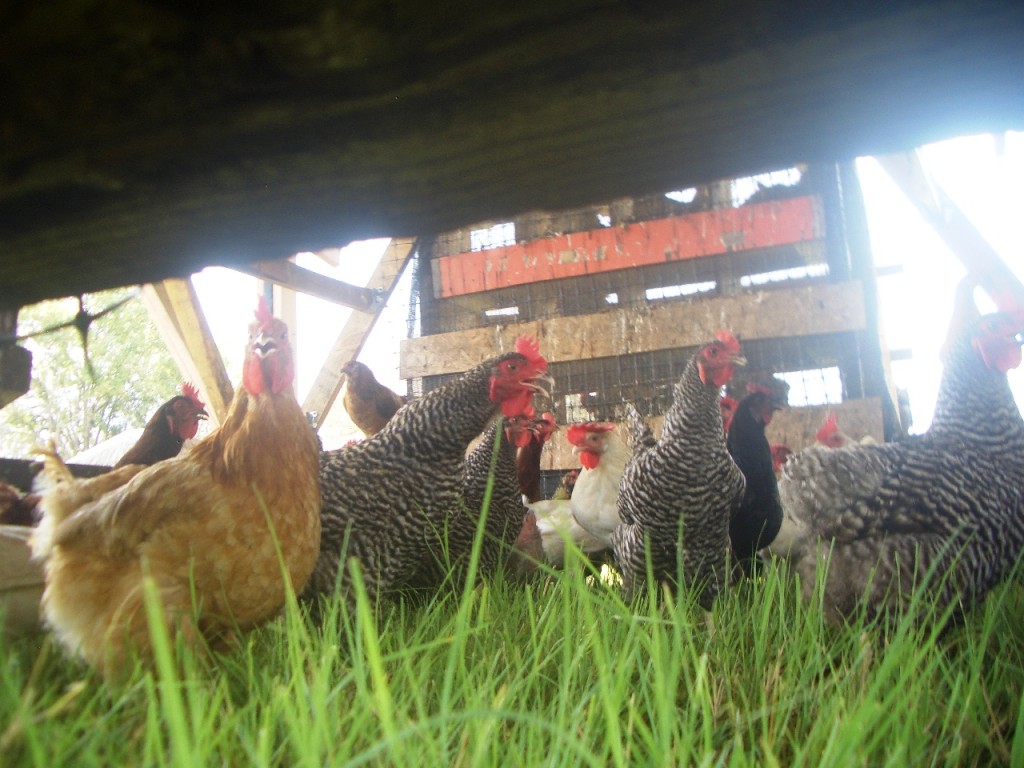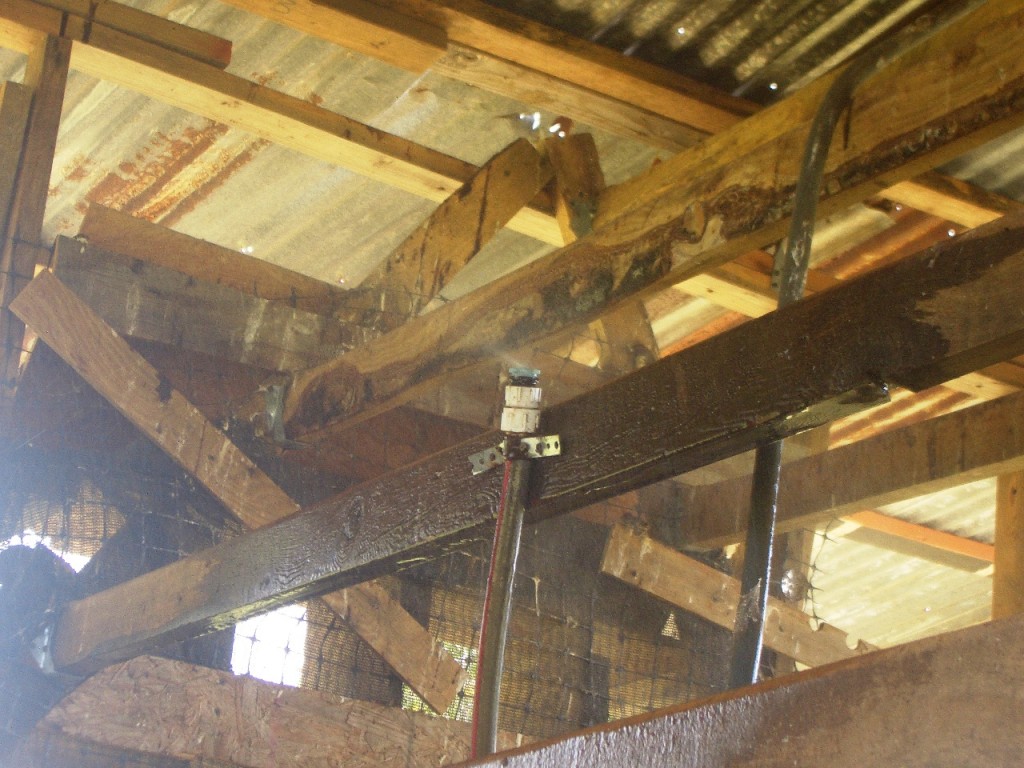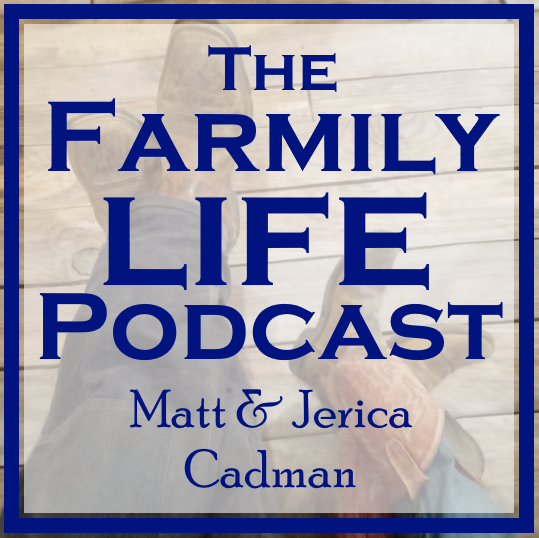At long last, we finally have a chance to tell you about our new EggMobile, built during the visit of some of our relatives that visit each spring to help us with ongoing work projects.
 Laying chickens have very specific and unique needs that must be fulfilled in order for them to live long, productive and happy lives. One of the things that makes Shady Grove Ranch different is that we keep our hens on pasture in a mobile pen. Contrasted with most other egg operations, which keep hens on one piece of ground continually, our mobile strategy allows the poultry manure to remain the asset that it was created to be, and it is spread across pasture with immensely less labor than would be required if the hens were in a permanent pen. It also allows the hens access to fresh new forage throughout their lives, which of course, results in delicious, nutrient-dense eggs. It’s a win-win situation!
Laying chickens have very specific and unique needs that must be fulfilled in order for them to live long, productive and happy lives. One of the things that makes Shady Grove Ranch different is that we keep our hens on pasture in a mobile pen. Contrasted with most other egg operations, which keep hens on one piece of ground continually, our mobile strategy allows the poultry manure to remain the asset that it was created to be, and it is spread across pasture with immensely less labor than would be required if the hens were in a permanent pen. It also allows the hens access to fresh new forage throughout their lives, which of course, results in delicious, nutrient-dense eggs. It’s a win-win situation!
We will walk you through our pasture-raised laying chicken operation. We have an assortment of breeds, mostly for the fun of having multi-colored eggs. But various breeds bring various traits into our operation. Some lay big giant eggs. Some are good setters, meaning they like to raise their own young (this will be good when we are ready to start hatching our own replacement hens). Some are wonderful foragers. And some are remarkably dependable egg producers.
In the picture you see, there are Barred Rock, Rhode Island Red, Americauana, Buff Orpington, Australorp, and Leghorn hens. They are out looking for bugs, seeds, and grasses on a lovely August morning.
Chickens need continual access to water, especially in the hot months in Texas. We use gravity-fed bell-style poultry waterers that keep their water as fresh and clean as is possible around chickens. If you’ve ever raised chickens, you know what we mean.
Chickens also need shade. Since we move their paddock around, we don’t always have access to trees. That’s what the extra-large roof on the Egg-Mobile is for. During the middle of the day, the hens often bed down in the cool grass under here to wait until the sun goes down a bit before going back out to forage.
In Texas, we have found that almost all animals need an external source of cooling in the summer months. We discovered a very low water usage mister system and placed one under the roof of the EggMobile. It’s made a huge difference in mortality rate of our hens during the summer. Not to mention egg production stays more consistent!
Hens are capable of making their own nests, but for production purposes, we want them to use the ones we provide. A hen needs to feel secure enough to rest for the hour or so that it takes to comfortably lay her egg. However, we have found that keeping the hens too secure and too warm makes them want to sit and hatch the eggs. So they sit, and they don’t eat or drink or lay any more eggs while they wait for their “clutch” to hatch. The way we decided to encourage them was to build nests with two solid walls and one wall that appears solid but allows significant light and air circulation into the box to keep the hen cool and aware and prevent her going into “broody fever.” It sure beats dunking the hens in cold water for 3 days straight! That works, too, but it’s a little violent…
 |
 |
 |
Here’s a shot of the back of the boxes. You can see the chicken silhouettes in the boxes.
To help the birds get up to their boxes, we provided some stairs.
 |
 |
Chickens feel especially secure when they don’t have to sleep on the ground (No, they don’t sleep in their boxes. That would result in very dirty eggs!) Here are their roosts, staggered so the poop drops onto the ground during the night, not onto the lower hens!
We provide all our critters, including the chickens, with salt. In Texas heat, the heavy water intake of animals must be balanced by having a good supply of salt and minerals.
Laying hens need a good amount of calcium to produce all those nice strong shells. They do get a large amount of minerals from the bugs and pasture they consume, but depending on the season, they may need some additional help, provided in the form of crushed coral and oyster shell.
Chickens are omnivorous and need a source of animal protein. Bugs are a major part of this, but we also supplement raw milk as much as possible. It’s a great probiotic, too. They LOVE it!
To ensure that our hens get the nutrition they need so they don’t become weak or resort to cannibalism, we supplement a soy-free, non-GMO peanut-based feeds that is locally milled. It’s pelletized so the chickens don’t waste it and so that they get a complete ration and don’t sort the feed.
Matt moves the EggMobile about once a week, providing the chickens with a new paddock surrounded by electric net fencing. It’s pretty labor intensive, but worth it for the great eggs we get in return.
On to the new paddock!
All for lovely, pasture-raised eggs…

















